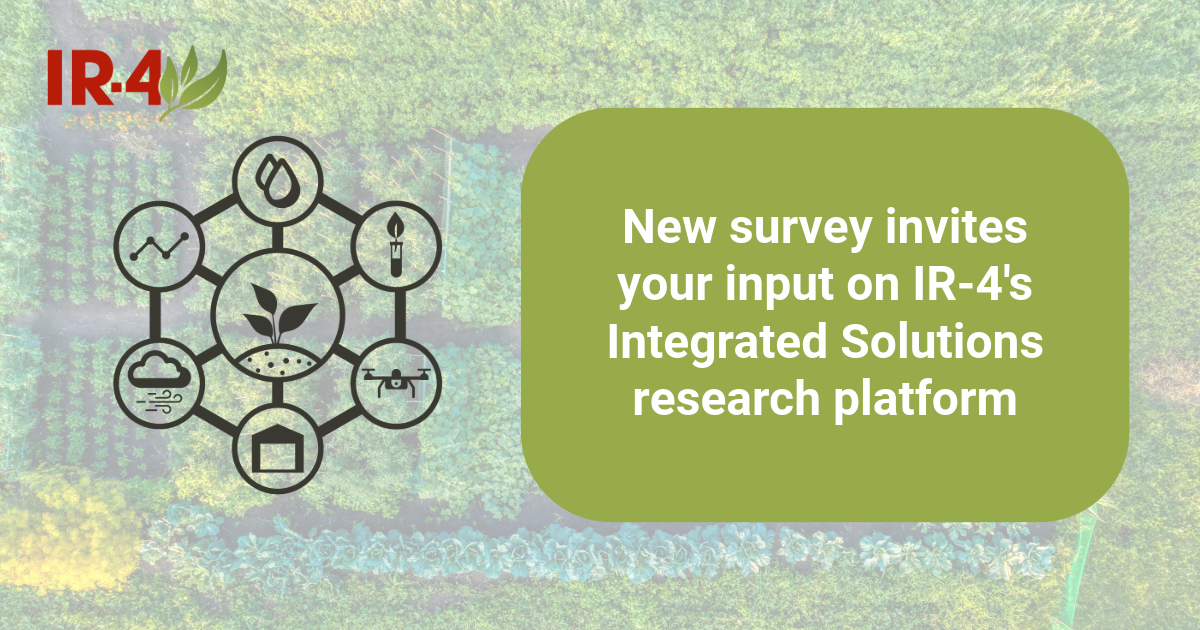A Letter From IR-4 Executive Director, Jerry Baron

Dear Friends,
The IR-4 Project is collecting feedback regarding the Integrated Solutions Platform and its accomplishments over the last seven years. In this regard, we request that you complete the new survey and, if possible, attend a listening session at the upcoming Food Use Workshop.
As background, in 2017, the IR-4 Project Management Committee approved a proposal to establish the Integrated Solutions (IS) Platform. Below is the original communication:
IR-4 is pleased to announce that it is instituting some changes in its product performance research that will increase efficiency through the integration of biopesticides and conventional chemical products in IR-4’s new “Integrated Solutions” research. Those of you who are familiar with IR-4 Product Performance research efforts will discover that “Integrated Solutions” is a hybrid of existing Food Use “Pest Problems Without Solutions (PPWS)” research and elements of the traditional Biopesticide research program.
Integrated Solutions research will focus on:
- Identifying solutions to an existing pest management void through product screening research. This is similar to the Food Use “Pest Problems Without Solutions” projects, except that biopesticides will be used to a greater extent in the screening trials, along with conventional products;
- Integrating biopesticides into conventional (non-organic) agricultural systems to help prevent development of pest resistance;
- Substituting biopesticides or short-residual reduced-risk products close to harvest to reduce the risk of MRL violations for specialty crops targeted for export markets (residue mitigation); and
- Integrated solutions will also address organic production systems1 needs.
The proposal went on to note why IR-4 was making the change:
The environment in which IR-4 operates has changed. Registering a new conventional product now costs more than $275 million. This high cost of bringing innovation to the marketplace has reduced the number of new conventional products. Meanwhile, industry and the public sector have increased development activities on a new generation of efficacious biopesticides that play a more significant role in conventional (non-organic) agricultural production systems. IR-4 believes that with the introduction of more biopesticides that are more efficacious, the integration of this technology and demand for additional products will continue to grow.
The first research trials were conducted in 2018. Next year, 2025, marks the seventh season of research. Here are some statistics since the beginning of the IS research platform:
- 488 new proposals for projects received
- 88 projects funded
- More than 400 field trials conducted
Successes in funded research are defined as identifying a product tested in a residue study, modifying a use pattern, or providing a crop protection tool for the organic community. While we can define success, we have not yet assessed which research projects can be considered completed and successful.
We are in the process of assessing the program, including its successes, and would like your input as we do this assessment. To assist, please take a few minutes to provide feedback on your views of the IR-4 Integrated Solutions Platform by completing the new survey.
The responses will lead to some targeted questions at a listening session, which will be held during IR-4’s 2024 Food Use Workshop. The listening session is scheduled for Wednesday, September 11 at 1:00 p.m. CT. To have your responses inform the FUW discussion, please submit them by 11:59 p.m. PT on Friday, September 6. Responses are welcome after this deadline, but they won’t shape the listening session’s discussion questions.
Thank you in advance for your feedback and support of the IR-4 Project and our efforts to provide safe and effective pest management solutions for specialty crop growers.
Sincerely,
Jerry Baron
Executive Director, The IR-4 Project
________
1 Since the original approval, the scope of Integrated Solutions Platform has expanded to also include genetics, (resistant varieties) application technology, and cultural practices.
